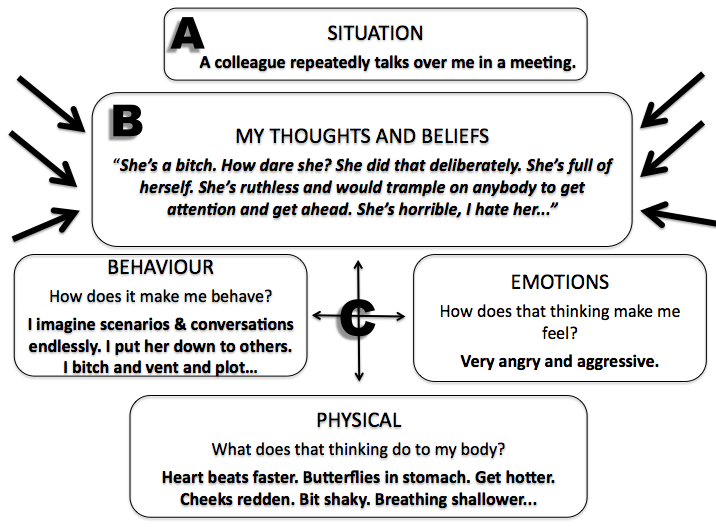Cognitive science tells us that when stress becomes a disorder it causes a shift in thinking and physicality – so that our attributional style (ie the way we explain the world to ourselves, also known as our ‘explanatory style‘), and our body’s threat response, become distorted and out of proportion (dysregulated), which can cause us (and those around us) more upset than events actually warrant.
Events and situations, no matter how challenging, influence (however strongly) our feelings and behaviors – ultimately, it is how we perceive them that determines how we will respond. The same thing can happen to ten different people, and they will all process it differently, uniquely, and will feel and behave differently in response to it.
We can literally learn well being with Cognitive Behavioral Therapy / Training, to build awareness and self-management, to develop a healthier more proportional response to life and stressors – CBT skills give you structure to catch and examine your attributional style, to examine it to see if it’s distorted and overdramatic, to see if it is based on false evidence and assumptions and bad thinking habits, and to REFRAME it to more rational, healthy and undistorted style instead.
The following are simple examples – giving the same stressful situation – but three different attributional styles which cause different physical/emotional/behavioural responses – to show you how it typically goes.
We’re looking to see which styles are: Over-responsive? Overdramatic? Too physically pumped up? Too personalised? Helpful or unhelpful? Rational or irrational? Clear or distorted? Self sabotaging? And which are reasonable and cool and moderate.
And note, for the purpose of this work we are philosophers looking to correct our ‘self talk’ and responses to situations – there is no right or wrong or good or bad, it simply is what it is. Learning self examination with unconditional acceptance is a beautiful science. Read on to consider three different evaluations and responses to the same situation…
A high drama / unhealthy example:
A moderate drama / quite healthy example:
A low drama / very healthy example:
Do you get it? Great. Walk through this blog for more information and homework so that you can begin to journal and shift your own thinking, learning awareness and self regulation to feel better and do better, to get better outcomes…
Download crisp clean slides of these examples for printing: https://iveronicawalsh.files.wordpress.com/2012/06/cbt-abc-example-response-slides.pdf
Good luck! (And most importantly, enjoy. Cognitive science is fun).




